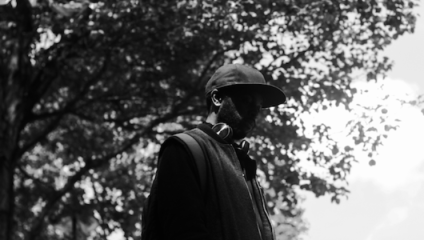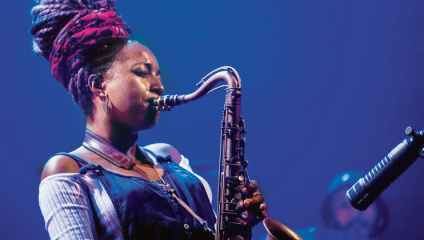
London Calling spoke to exciting young jazz musicians Nubya Garcia and Alfa Mist.
There’s something stirring in the London jazz scene.
In fact, stirring is somewhat of an understatement. A new wave of jazz musicians have arrived to shake up the scene, building on the success of previous generations.
Albums like Kendrick Lamar’s To Pimp A Butterfly have brought the genre once again into mainstream consciousness, while artists like Jordan Rakei spearhead a jazzy, neo-soul movement.
This August, two of London’s brightest new talents share the bill at Ronnie Scott’s iconic jazz club: saxophonist Nubya Garcia and pianist Alfa Mist.
We spoke to the pair about their respective new projects, backgrounds, their influences and how they view the current jazz scene.
Nubya Garcia and Alfa Mist have taken very different paths to their double billing at Ronnie Scott’s Jazz Club, though the two share a number of similarities. Both grew up in London, were passionate about music from an early age, and have reached this point in their careers through a combination of raw talent, hard work and collaboration.
Garcia began playing classical music from a young age. “I played violin, piano and recorder and I went pretty in with that, taking weekend classes and having lessons at Camden Music. Around 10 I started playing saxophone, and a couple of years after that I joined Nikki Yeoh’s jazz group. That was my first taste of playing jazz, my introduction to improvising. I owe it all to Nikki really.”
Mist took a different route to jazz. “At school I was listening to grime and hip hop, making beats in my room. I was listening to 9th Wonder, Madlib and J Dilla, and asking myself why my beats didn’t sound like theirs. Then I discovered sampling, started digging for records and discovered so many other genres of music. I was listening to Indian classical music, folk, film scores - and then I came to jazz, and stayed there for quite a while.”

"I wanted to experiment and do a project where I was unapologetically myself.”
All the while, Garcia was moving through the youth jazz scene at an astonishing rate.
“I moved up from intermediate to senior whilst doing my own stuff. I went to the Royal Academy of Music’s Jazz Department Juniors on Saturdays; I did as many things as possible. Tomorrow’s Warriors played a big part in my development. They made me realise I could continue to do this as a career - it was a really positive environment where I felt really comfortable.”
Mist, on the other hand, never had formal training. “I decided to teach myself piano around college time - I just started trying to figure out how to play - and I’m still learning now.”
Mist’s recent EP, Antiphon, is a change of direction from previous work and has garnered him plenty of accolades. “I put a couple of EPs out beforehand which had features from singers or rappers on every song. Antiphon came about because, rather than collaborating and adapting to match people I was working with, I wanted to experiment and do a project where I was unapologetically myself.”

Garcia, meanwhile, is one of the most prolific players working today, with a huge list of collaborations and projects behind her already. Nubya’s 5ive is also her first collection of self-written songs.
“Adam Moses from Jazz Re:freshed asked me when I was going to put my own group together. I wasn’t really sure, but he said they wanted to put it out. So I got my arse in gear and wrote some music! The EP is a representation of everything I’m listening to, or was when I was writing.”
Both Mist and Garcia recorded their EPs in a traditional one-take, press play and record, manner. For Garcia, recording “wasn’t stressful, it wasn’t stop-start, it was just ‘do a take’ then another if it’s needed. All the takes were great - I know the guys so well and it was a natural process.”
Mist found the process was similar: “I had all these ideas that I had written way before. We recorded it in three days and I brought in a few musicians, showed them the music, and everyone just did it. I gave people space to improvise. I included clips, throughout the EP, of a conversation I had with two of my brothers about mental health and relationships. I think it focuses it pretty well. I’m very careful about calling it jazz. I listen to a lot of jazz music, and I know I’m not worthy of that title at the moment.”
Although he might not think himself worthy, Mist is undoubtedly a very fine jazz pianist: you don’t get to play Ronnie’s if you’re a slouch on the ivories.
Is he looking forward to the gig? “I’m really excited about it. It’s bucket list stuff.” And Garcia? Is she excited? “Hell yeah, of course. Ronnie’s has been a big part of my life since I was 16, you know? I was around when the late show started with Michael Mwenso, and I’ve spent many nights there listening to incredible music, so it’s great to come back and play. I’ve played there with different jazz ensembles but this is the first time I’ll be playing my own music.”

So what do Alfa and Nubya think of the state of the current jazz scene? “It’s at a really special time. There’s an older generation still paving the way and there’s a younger generation that are incredibly hungry,” thinks Garcia.
“You grow up together, you learn to play music together. That’s a really strong bond. Venues play a big part in that as well. People found each other via Tomorrow’s Warriors, the Roundhouse, Jazz Re:freshed, Good Evening Arts - they were all there when we were trying stuff out for the first time. They took our music from the bedroom out into the real world.”
Mist agrees that venues have played a big role in facilitating nights where musicians could meet and play. “I used to go to Jazz Re:freshed at Mau Mau bar quite a bit. There were all these musicians - Kaidi Tatham, Richard Spaven - who have been doing this stuff for a while. It might be because of the internet, or the fact that people are completing projects, but there’s more exposure now. The rate of music hasn’t changed much: it’s the exposure.”
One thing they both agree on is that it’s a special time for jazz. “People who don’t normally come to jazz are listening to it. Something is happening”, says Mist. Garcia is more effusive: “It’s a really strong thing - it feels great to be a part of - and lots of people are smashing it out and doing incredible things. It’s amazing really.”